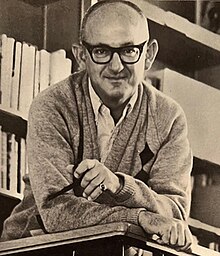Earle Hagen
Earle Hagen | |
|---|---|
 Earle Hagen in the 1960s | |
| Background information | |
| Birth name | Earle Harry Hagen |
| Born | July 9, 1919 Chicago, Illinois, U.S. |
| Died | May 26, 2008 (aged 88) Rancho Mirage, California |
| Genres | Soundtrack |
| Occupation(s) | Composer |
| Years active | 1939–2008 |
Earle Harry Hagen (July 9, 1919 – May 26, 2008) was an American composer who created music for films and television. His best-known TV themes include The Dick Van Dyke Show, I Spy, That Girl and The Mod Squad. He is also remembered for composing and whistling the theme to The Andy Griffith Show; writing the instrumental song "Harlem Nocturne" used as the theme for television's Mickey Spillane's Mike Hammer; and co-writing the theme song to Tim Conway's Western comedy Rango.[1][2]
Biography
Born in
He began teaching trombone in the 1930s in order to make extra money. In 1940, he went to work for
Hagen's most ambitious body of work, however, came from his work on
Other television theme songs that Hagen composed were the themes for My Sister Eileen, The Dick Van Dyke Show, Gomer Pyle, U.S.M.C., That Girl (along with I Spy, Thomas and Leonard productions), and The Mod Squad.[1][5] His film work included the scores for Spring Reunion (1956) and The New Interns (1964).
He was the in-house composer for the 1970s television series Eight Is Enough (1977–1981).
At the end of his life he continued teaching and wrote books on music arranging and scoring. Sometimes his only fee was a box of golf balls because of his passion for golfing.[1] He wrote one of the first textbooks on scoring, Scoring for Films: A Complete Text. In 2000, he published his autobiography, Memoirs of a Famous Composer Nobody Ever Heard Of.[3] Two of his students were fellow Emmy-winning composers and orchestrators Bruce Babcock and Harvey Cohen[6][7]
Hagen was married for 59 years to Elouise "Lou" Sidwell, a former big-band singer, until her death in 2002. They had two sons, James and Deane Hagen. He married his second wife, Laura (Gunn) Roberts, in 2005.[1]
Hagen died of natural causes in Rancho Mirage.[1] He is buried at Desert Memorial Park in Cathedral City, California.
Hagen had a Golden Palm Star on the
Bibliography
- 1971 – Scoring for Films: A Complete Text. – Los Angeles, California: Alfred Publishing Company. ISBN 0-88284-388-5
- 1990 – Advanced Techniques for Film Scoring: A Complete Text. – Los Angeles, California: Alfred Publishing Company. ISBN 0-88284-447-4
- 2000 – Memoirs of a Famous Composer Nobody Ever Heard Of. – Philadelphia, Pennsylvania: Xlibris. ISBN 0-7388-5720-3
References
- ^ a b c d e f g Weber, Bruce (May 28, 2008). "Earle Hagen, Who Composed Noted TV Tunes, Dies at 88". Television: The New York Times. Retrieved: May 28, 2008.
- ^ Zoglin, Richard (March 3, 1986). "Back to the Time Warp". Time. Retrieved: May 28, 2008.
- ^ San Jose Mercury News). – May 27, 2008. – Retrieved: May 28, 2008
- ^ Bruce Babcock (2009), Interview with Earle Hagen
- ^ Jacket cover, TeeVee Toons Presents, Television's Greatest Hits (TeeVee Toons, Inc., 1985)
- ^ "Harvey Cohen". Obituary. The San Diego Union-Tribune. Associated Press. February 3, 2007. Archived from the original on May 31, 2008. Retrieved November 12, 2018.
- ^ "FMS: Feature [Composer/Arranger Harvey Cohen Dead at 55]". Welcome to The Film Music Society. December 24, 1999. Retrieved November 12, 2018.
- ^ Palm Springs Walk of Stars: By Date Dedicated Archived December 8, 2012, at the Wayback Machine
External links
- Earle Hagen at IMDb
- The Best of All Worlds Fan Site with career reflections & highlights.
- Earle Hagen at The Interviews: An Oral History of Television
- "Earle H. Hagen". Composer. Find a Grave. May 27, 2008. Retrieved June 30, 2011.
